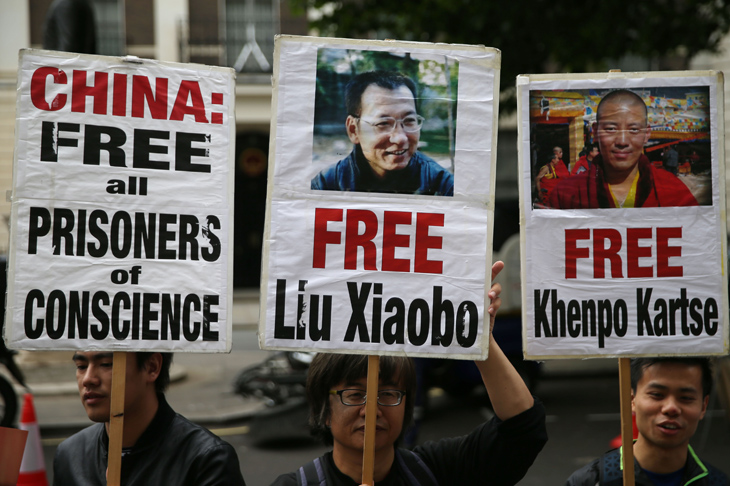Liu Xiaobo, China’s only Nobel Peace Prize winner, has died, eight years into his 11-year prison term. He was the greatest champion of democracy in a country where there are many others also detained by the Communist Party, which insists those convicted are not dissidents but criminals.
Tried in 2009 for subversion, Liu had just been moved under police guard into a hospital and diagnosed with inoperable liver cancer. While his original sentence aroused an international outcry, followed by the award of the prize in Oslo — where his chair was empty — the news of his fatal illness provoked demands that he be allowed to go abroad for possible treatment. Liu himself said he would prefer to die in the West —as long as his wife, the indomitable Liu Xia, who has been under house arrest in Beijing for almost as long as her husband’s prison sentence, was allowed to accompany him, together with her brother, another political prisoner.
None of us who were in China during the ‘Beijing Spring’ of 1989, when demonstrations that began in April in Tiananmen Square spread to several hundred cities, can forget the dramatic appearance of Liu Xiaobo. Hearing of the events while a visiting scholar at Columbia University, he hurried back to be part of the greatest spontaneous uprising in China since the Communist victory in 1949. Until his arrival, the calls — extraordinary enough — had been for an end to official corruption and the reinstatement of party general secretary Hu Yaobang, who died soon after his sacking for remarks about Chinese behaviour in Tibet. What Liu did, with his legendary wild gesticulations, was to remind the protestors that what China needed most was democracy. By this he meant precisely what readers of The Spectator mean by the word.
In China, above all, it meant the end of Party rule. After the bloody smashing of the demonstrations, on the night of 3-4 June, Liu was imprisoned for three years, as were many others. After his release he associated himself with Charter 08, whose text he did not write, but whose detailed calls for democracy made clearer than ever that Party authority must end. Soon Liu was arrested again, tried, and sentenced to 11 years behind bars, a heavy sentence even in China. He was allowed to speak just before being taken away, although the judges cut him short. ‘I have no enemies and no hatred,’ he said. ‘None of the police who monitored, arrested, and interrogated me, none of the prosecutors who indicted me, and none of the judges who judged me are my enemies…
‘Enemy mentality will poison the spirit of a nation, incite cruel mortal struggles, destroy a society’s tolerance and humanity, and hinder a nation’s progress toward freedom and democracy. That is why I hope to be able to transcend my experiences as I look upon our nation’s development and social change, to counter the regime’s hostility with goodwill, and to dispel hatred with love.’
Two years later he was awarded the Nobel. A friend recalled what Liu Xiaobo told him years before. ‘We are lucky to live in this time and this place, China,’ Liu said. ‘It may be difficult for us, but at least we do have a chance to make a very, very large difference. Most people in their lifetimes are not offered this kind of opportunity.’
China’s president, Xi Jinping, is now overseeing new crackdowns on human rights advocates. He has taken to praising Mao, who had been somewhat ignored in China for a few years. Xi just visited Hong Kong to mark the 20th anniversary of its transfer to Beijing’s authority: five booksellers in the territory who were about to provide books on subjects hated by Beijing had already been kidnapped back to the mainland. An ardently pro-Beijing chief executive of Hong Kong, Carrie Lam, has just assumed office. China’s ambassador in London told the BBC last week how Hong Kong has now flourished under China’s encouragement.
What can Britain learn from Liu Xiaobo? Anson Chan, once Hong Kong’s feisty chief secretary, has emphasised that both the UK and China had agreed that Hong Kong should remain independent of Party control. When told Britain could do nothing to blunt increasing influence from over the border, Mrs Chan replied: ‘Nonsense.’
To placate Beijing, David Cameron’s government declared that it had ‘turned the page on the Dalai Lama’ — in other words, it was no longer going to make a fuss about human rights because China is so powerful. Now our government can regain some honour, by shouting loudly that Liu Xiaobo should have been set free to live or die in the West.
Liu Xiaobo died on Thursday July 13, 2017, in China, the day this piece was published.






Comments